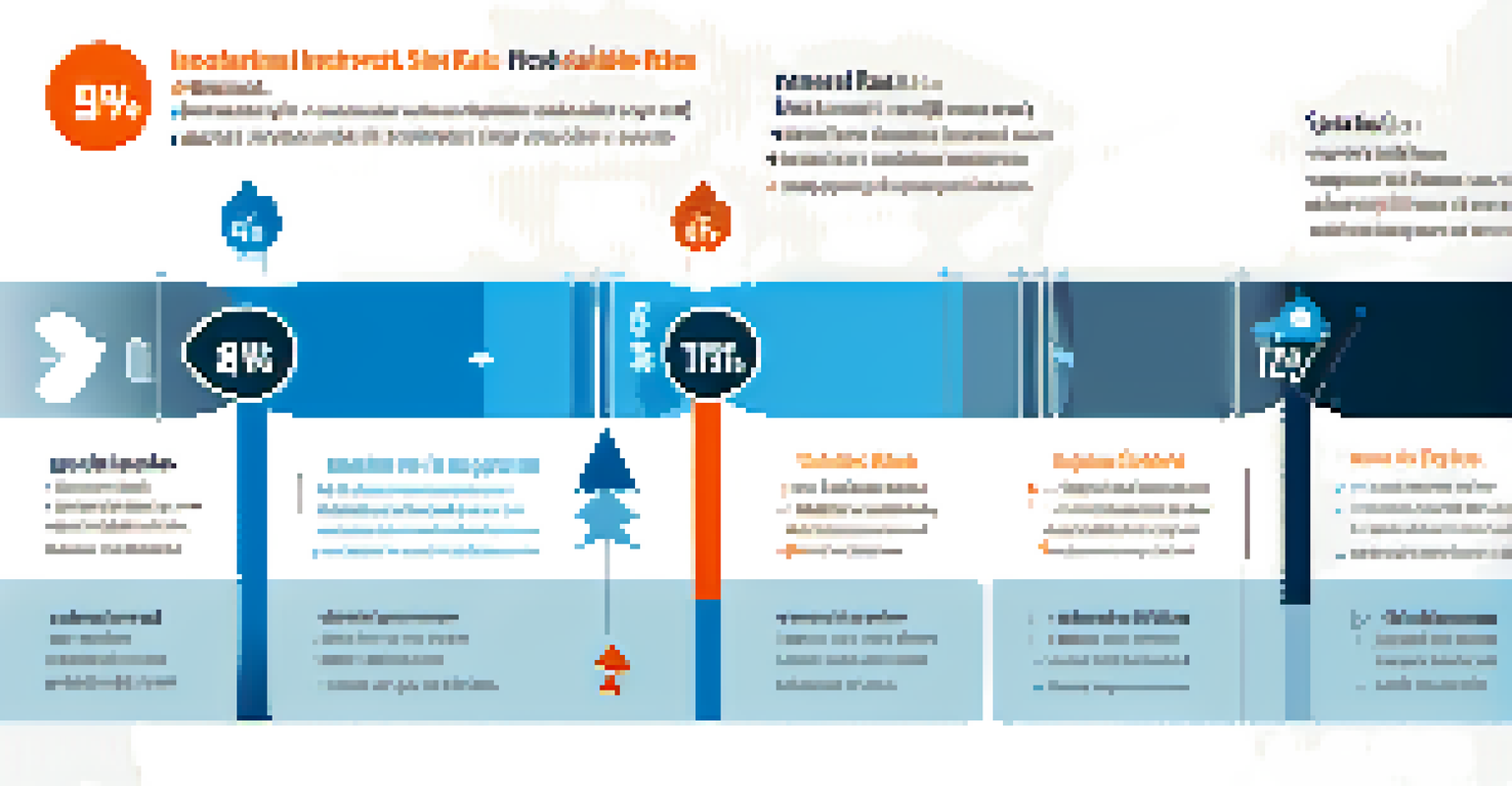How Interest Rates Affect Your Mortgage Payments Explained

What Are Interest Rates and Why Do They Matter?
Interest rates are the cost you pay to borrow money, typically expressed as a percentage. They play a crucial role in determining how much you’ll pay for a mortgage over time. A higher interest rate means higher monthly payments, while a lower rate can save you a significant amount of money.
In the world of finance, the only thing that is certain is uncertainty.
For example, if you're looking at a $200,000 mortgage, a 4% interest rate will cost you more in monthly payments than a 3% rate. Even a small difference in the interest rate can lead to thousands of dollars in extra costs over the life of the loan.
Understanding interest rates can help you make informed decisions about when to buy a home or refinance your mortgage. However, it's not just about the rates themselves but also about how they affect your overall financial picture.
How Fixed and Variable Rates Affect Your Payments
Mortgages typically come with either fixed or variable interest rates. A fixed-rate mortgage locks in your interest rate for the life of the loan, providing predictability in your monthly payments. This means you’ll know exactly how much you owe each month, regardless of market fluctuations.

On the other hand, a variable-rate mortgage starts with a lower interest rate but can change over time based on market conditions. While this could lead to lower initial payments, it also introduces uncertainty, as your payment amount may rise significantly if rates increase.
Interest Rates Impact Payments
Higher interest rates lead to increased monthly mortgage payments, while lower rates can save you significant money over time.
Choosing between fixed and variable rates is a crucial decision for homeowners. It often depends on your financial stability and how long you plan to stay in the home, as well as your tolerance for risk.
The Relationship Between Interest Rates and Monthly Payments
When interest rates rise, your monthly mortgage payments generally increase as well. This is because a larger portion of your payment goes toward interest rather than paying down the principal balance. For many homeowners, this can strain monthly budgets and lead to financial stress.
Interest rates are like a thermometer for the economy.
Conversely, when rates decrease, your monthly payments may drop, giving you more financial flexibility. You might find that you can afford a larger home or allocate funds to other expenses, like savings or investments.
Understanding this relationship is vital for budgeting and planning your finances. It helps you gauge the best time to buy or refinance, ensuring you make the most financially sound decisions.
Impact of Economic Conditions on Interest Rates
Interest rates are influenced by various economic factors, including inflation, employment rates, and central bank policies. For instance, when the economy is booming, interest rates may rise to keep inflation in check, which can lead to higher mortgage payments.
On the other hand, during economic downturns, rates often drop to stimulate growth, making borrowing cheaper. This shift can provide opportunities for prospective homeowners to secure lower rates and save on their mortgages.
Fixed vs. Variable Rates
Choosing between fixed and variable interest rates affects your payment stability and financial planning, depending on your risk tolerance.
Keeping an eye on these economic indicators can give you a better understanding of when to enter the housing market. Being informed can help you take advantage of favorable conditions, ultimately benefiting your financial situation.
How to Calculate Your Mortgage Payments
Calculating your mortgage payments involves more than just the interest rate; you also need to consider the loan amount, loan term, and additional costs like property taxes and insurance. A common formula helps you determine your monthly payment, factoring in both principal and interest.
For example, online mortgage calculators can simplify this process, allowing you to see how changes in interest rates affect your payments instantly. By entering different rates and amounts, you can visualize your financial commitments more clearly.
Understanding how to calculate your payments empowers you to make smarter financial decisions. It ensures you're not caught off guard by how much you'll owe each month, allowing for better budgeting.
Refinancing: When to Consider It
Refinancing your mortgage can be an effective way to take advantage of lower interest rates. If rates drop significantly since you secured your mortgage, refinancing could lower your monthly payments and reduce the total interest paid over the life of the loan.
However, it's essential to weigh the costs associated with refinancing, such as closing fees and the time it takes to break even on those costs. A thorough analysis can help you decide if refinancing is a financially sound move.
Refinancing for Better Rates
Refinancing can lower your monthly payments if interest rates drop, but it's essential to consider associated costs and your financial goals.
Ultimately, the decision to refinance should align with your long-term financial goals. If it helps you save money and improve your financial situation, it may be worth considering.
Tips for Managing Your Mortgage Payments
Managing your mortgage payments effectively involves staying informed about interest rates and making strategic financial choices. One way to ease the burden is to budget for potential rate increases, especially if you have a variable-rate mortgage.
Additionally, making extra payments toward your principal can reduce the overall interest you pay and shorten the life of your loan. Even small additional payments can lead to significant savings over time.

Lastly, maintaining a strong credit score can help you secure better interest rates in the future. Being proactive about your mortgage and finances can lead to a more manageable and rewarding homeownership experience.